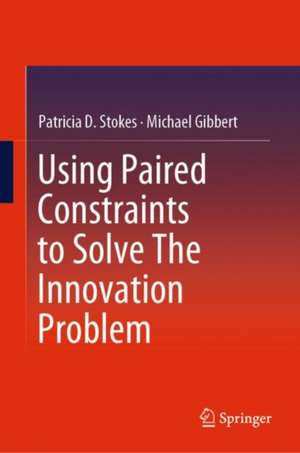Using Paired Constraints to Solve The Innovation Problem
Autor Patricia D. Stokes, Michael Gibberten Limba Engleză Hardback – 30 oct 2019
The authors have used their experience working in creative industries, combined with their academic perspective to create a formal, teachable tool for solving innovation problems. This consists of a formal structure (the problem space), a functional strategy(the paired constraints) and process. (solution by substitution).
This book provides a practice section, allowing anyone interested in solving the problem of innovation to learn and develop their skills.
| Toate formatele și edițiile | Preț | Express |
|---|---|---|
| Paperback (1) | 543.01 lei 38-44 zile | |
| Springer International Publishing – 30 oct 2020 | 543.01 lei 38-44 zile | |
| Hardback (1) | 554.91 lei 38-44 zile | |
| Springer International Publishing – 30 oct 2019 | 554.91 lei 38-44 zile |
Preț: 554.91 lei
Preț vechi: 693.64 lei
-20% Nou
Puncte Express: 832
Preț estimativ în valută:
106.22€ • 115.41$ • 89.28£
106.22€ • 115.41$ • 89.28£
Carte tipărită la comandă
Livrare economică 17-23 aprilie
Preluare comenzi: 021 569.72.76
Specificații
ISBN-13: 9783030257705
ISBN-10: 3030257703
Pagini: 85
Ilustrații: XXIV, 85 p.
Dimensiuni: 155 x 235 x 15 mm
Greutate: 0.33 kg
Ediția:1st ed. 2020
Editura: Springer International Publishing
Colecția Edizioni della Normale
Locul publicării:Cham, Switzerland
ISBN-10: 3030257703
Pagini: 85
Ilustrații: XXIV, 85 p.
Dimensiuni: 155 x 235 x 15 mm
Greutate: 0.33 kg
Ediția:1st ed. 2020
Editura: Springer International Publishing
Colecția Edizioni della Normale
Locul publicării:Cham, Switzerland
Cuprins
Innovation is a Problem-Solving Process: Structure.- Innovation is a Problem-Solving Process: Strategy.- What’s Your Problem? An Innovation Typology.- Category I: Same Path/Same Goal → New Path/Same Goal.- Category II: New Path/Same Goal.- Category III: Same Path/New Goal à New Path/New Goal.- Category IV: New Path/New Goal.- Evaluating Usefulness: Other Models and Ours.- Putting Paired Constraints into Practice.
Notă biografică
Patricia D. Stokes is an adjunct professor of psychology at Barnard College, Columbia University. Her areas of expertise are skill acquisition, breaking problems down into the structure of their solutions and – by extension – creativity/innovation as problem solving processes. She utilises her experience at art school and in advertising to frame her work as an academic. She has written two books on the subject of paired constraints, as well as several journal articles.
Michael Gibbert is a professor of sustainable consumption in the communication science faculty of Svizzera Italiana at Lugano, where he is also the director of the World Challenge Program. He was previously assistant/associate professor at Bocconi University in Milan, research associate at INSEAD, and post-doc at the Yale School of Management. He has authored or co-authored multiple books and journal articles, and has acted as guest editor for journals such as Long Range Planning, Industrial Marketing Management and the Journal of Product Innovation Management.
Michael Gibbert is a professor of sustainable consumption in the communication science faculty of Svizzera Italiana at Lugano, where he is also the director of the World Challenge Program. He was previously assistant/associate professor at Bocconi University in Milan, research associate at INSEAD, and post-doc at the Yale School of Management. He has authored or co-authored multiple books and journal articles, and has acted as guest editor for journals such as Long Range Planning, Industrial Marketing Management and the Journal of Product Innovation Management.
Textul de pe ultima copertă
This book defines innovation as both a problem and a problem-solving process. It allows readers to approach innovation as a straight-forward problem solving process, and teaches them the paired constraint process to solve specific innovation problems.
The authors have used their experience working in creative industries, combined with their academic perspective to create a formal, teachable tool for solving innovation problems. This consists of a formal structure (the problem space), a functional strategy(the paired constraints) and process. (solution by substitution).
This book provides a practice section, allowing anyone interested in solving the problem of innovation to learn and develop their skills.
The authors have used their experience working in creative industries, combined with their academic perspective to create a formal, teachable tool for solving innovation problems. This consists of a formal structure (the problem space), a functional strategy(the paired constraints) and process. (solution by substitution).
This book provides a practice section, allowing anyone interested in solving the problem of innovation to learn and develop their skills.
Caracteristici
Presents a useable framework for solving the innovation problem Utilises authors real-world creative experience to provide a solution Teaches a paired constraint process of innovation, distinct from other methods
